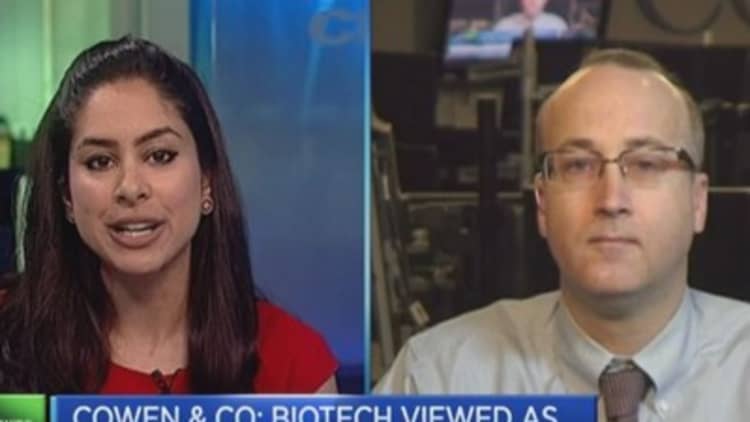My goal is very, very, very straightforward. To build a highly focused neurology company whose goal is...to become one of the best neurology companies in the world over time.Jeremy LevinCEO of Ovid Therapeutics
Leading a start-up focused on rare neurological disorders may not be an obvious transition for someone who helmed the world's largest generic drugmaker, but that's exactly what Jeremy Levin set out to do after his abrupt departure from Israel's Teva in 2013.
The result is Ovid Therapeutics, which announced on Thursday Levin's appointment as chief executive, and that it forged its first deal, with Danish drugmaker Lundbeck.
The idea: identify compounds shelved by other drug companies that are likely to have promise in rare brain diseases and bring them in for development. The plan is to target only disorders that are well understood but not well served, Levin explained, rare diseases where the science has advanced but hasn't been matched to medicines.
"My goal is very, very, very straightforward," Levin said in a telephone interview. "To build a highly focused neurology company whose goal is, hopefully, to become one of the best neurology companies in the world over time."

Levin focused on neurology after seeing several large drugmakers back away from the field following large-scale disappointments in Alzheimer's disease. But at the same time, he said, "there are new ways of measuring brain deterioration, new assays, new mouse models that have been developed. All of this is really, really encouraging."
In the Lundbeck deal, Ovid gains gaboxadol, a pill it plans to test in two rare conditions called Angelman syndrome and Fragile X syndrome. Ovid, now calling the compound OV101, plans to start the mid-stages of trials next year. As part of the agreement, Lundbeck will take a minority stake in Ovid and is eligible for potential milestone payments and royalties; other financial details weren't disclosed.
Levin became chairman of Ovid last year, after leaving the CEO role at Teva amid widely publicized disputes with the board. Ovid was founded by neurologist Matthew During, now chief scientific officer, who pored over disease physiology and the mechanisms of thousands of compounds to find potential matches, Levin said.
Read MoreWhat's in a name? For drugs, a lot of Zs and Xs
"The science of older medicines that had been around for some time was now becoming clearer and clearer as to how they worked on the brain," Levin explained. "Some that had been discarded were interesting molecules but weren't being applied to the right disease. Science caught up with some of the medicine-making that was going on."
Gaboxadol was originally tested by Lundbeck and Merck for insomnia, but didn't meet the goals of studies, Levin said. The drug has been tested in more than 3,000 patients, Ovid said, meaning its safety profile is better understood than a medicine starting from scratch.
Levin plans to repeat this formula in several more deals to build a pipeline, and said Ovid already has three additional programs behind OV101. They focus on Lewy body dementia, Dravet syndrome and Prader-Willi syndrome.
Never heard of them? That's the point.
"The goal is to work with drugs that have a mechanism that one can understand," Levin said. "Orphan diseases often are genetic; they have mechanisms you understand and there are no treatments. The consequence is you have the opportunity, if you have the right medicine, of being highly successful and that's exactly what we are going to look to do."
Read More5 biotech bets: Trading a surging sector
"Orphan" diseases in the U.S. are defined as those affecting fewer than 200,000 patients. Companies from Alexion to Sanofi's Genzyme to a host of younger biotechs have found success treating maladies even rarer, numbering in the tens of thousands of patients or fewer.
Angelman syndrome affects an estimated 4,000 patients in the U.S., Ovid said, and is characterized by developmental delays, seizures and lack of speech, according to the Angelman Syndrome Foundation. Fragile X, another genetic neurological disorder, affects more, about 100,000 patients in the U.S., according to Ovid.
Unlike most start-ups in biotechnology, Ovid isn't backed by venture capitalists.
"Ovid's investors include both major institutional funds and private investors," Levin said. "The institutional investors are from the DoubleLine and TradeLink families of funds. The private investors include Ovid senior management, particularly myself."
Venture capital funds, Levin said, invest at an earlier stage of company development, and expect exits through an initial public offering or a sale. Though an IPO may at some point be on the table, he said, "I'm less focused on that than getting medicines into trials. We're here to build."
He declined to disclose how much Ovid has raised in total.
Read MoreBiotech investing trends may be hurting innovation
Levin's deal strategy harkens back to his time before Teva, at Bristol-Myers Squibb, where he's credited with building the company's "string of pearls" set of acquisitions, which brought in the cancer drug Yervoy, among other products.
"Jeremy is one of the few people in the biopharma industry who has created value by executing on a thoughtful M&A strategy," said Alex Denner, the activist biotech investor who founded Sarissa Capital after leading Carl Icahn's health-care investments. Denner and Levin worked together when Icahn was invested in ImClone, which had a deal with Bristol-Myers on the cancer drug Erbitux.
Levin's not the only former CEO of a large drug company to strike out to build from the ground up: he pointed to Genentech's Art Levinson and Onyx's Tony Coles as well. Levinson is leading Calico, a Google-backed biotech focused on aging, while Coles founded Yumanity, also focused on neurodegenerative diseases.
"We're all doing it, I believe, because of innovation," Levin said, "and building the right culture for that."

